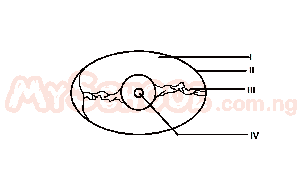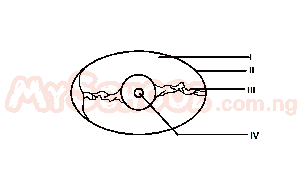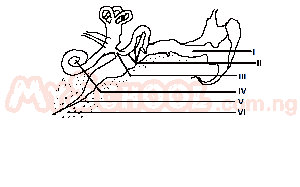Year :
2001
Title :
Biology
Exam :
JAMB Exam
Paper 1 | Objectives
11 - 20 of 48 Questions
| # | Question | Ans |
|---|---|---|
| 11. |
Urea formation occurs in the A. heart B. liver C. lung D. kidney |
B |
| 12. |
 The structure that holds the yolk in position is labelled A. II B. I C. IV D. III Detailed SolutionThe chalazae are a pair of spring-like structures that project from the equatorial region of the vitelline membrane into the albumen and are considered to act as balancers, maintaining the yolk in a steady position in the laid egg. |
|
| 13. |
 The part labelled IV is the A. albumen B. germinal disc C. yolk D. air space |
B |
| 14. |
The gas produced during tissue respiration can be identified by using A. calcium hydroxide B. copper sulphate C. calcium carbonate D. sodium hydroxide |
A |
| 15. |
A seedling grown in the dark is likely to be A. etiolated B. dormant C. sturdy D. stunted |
A |
| 16. |
The enzyme invertase will hydrolyze sucrose to give A. maltose and glucose B. glycerol and fatty acid C. glucose and fructose D. mannose and galactose |
C |
| 17. |
When yeast respire anaerobically, it converts simple sugar to carbon (IV) oxide and A. oxygen B. acid C. alcohol D. water |
C |
| 18. |
The transportation of oxygen and carbon (IV) oxide in mammals is carried out by A. leucocytes B. thrombocytes C. phagocytes D. erythrocytes |
D |
| 19. |
The veins of the leaf are formed by the A. vascular bundles B. cambium cells C. palisade tissue D. spongy mesophyll |
A |
| 20. |
 The parts which function together to bring about hearing are labelled A. IV, V and VI B. I, II, IV and VI C. I, II, III and IV D. I, II and IV |
C |
| 11. |
Urea formation occurs in the A. heart B. liver C. lung D. kidney |
B |
| 12. |
 The structure that holds the yolk in position is labelled A. II B. I C. IV D. III Detailed SolutionThe chalazae are a pair of spring-like structures that project from the equatorial region of the vitelline membrane into the albumen and are considered to act as balancers, maintaining the yolk in a steady position in the laid egg. |
|
| 13. |
 The part labelled IV is the A. albumen B. germinal disc C. yolk D. air space |
B |
| 14. |
The gas produced during tissue respiration can be identified by using A. calcium hydroxide B. copper sulphate C. calcium carbonate D. sodium hydroxide |
A |
| 15. |
A seedling grown in the dark is likely to be A. etiolated B. dormant C. sturdy D. stunted |
A |
| 16. |
The enzyme invertase will hydrolyze sucrose to give A. maltose and glucose B. glycerol and fatty acid C. glucose and fructose D. mannose and galactose |
C |
| 17. |
When yeast respire anaerobically, it converts simple sugar to carbon (IV) oxide and A. oxygen B. acid C. alcohol D. water |
C |
| 18. |
The transportation of oxygen and carbon (IV) oxide in mammals is carried out by A. leucocytes B. thrombocytes C. phagocytes D. erythrocytes |
D |
| 19. |
The veins of the leaf are formed by the A. vascular bundles B. cambium cells C. palisade tissue D. spongy mesophyll |
A |
| 20. |
 The parts which function together to bring about hearing are labelled A. IV, V and VI B. I, II, IV and VI C. I, II, III and IV D. I, II and IV |
C |